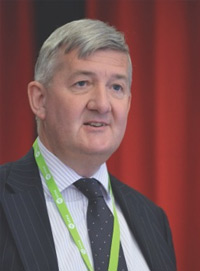Comment / FTs: platform for transformation
 It can feel like foundation trusts are the only relatively stable entities as we manage the transition in the NHS. The new NHS landscape – populated by clinical commissioning groups and NHS England – has created a host of short-term challenges for NHS providers. A number of factors have combined to increase providers’ income risk significantly, giving providers stability issues of their own.
It can feel like foundation trusts are the only relatively stable entities as we manage the transition in the NHS. The new NHS landscape – populated by clinical commissioning groups and NHS England – has created a host of short-term challenges for NHS providers. A number of factors have combined to increase providers’ income risk significantly, giving providers stability issues of their own.
While commissioners focus on getting the right funds in the right budgets, providers’ first concern is to establish who to bill under the new system – the area team or CCGs? With changes to both purchasers and currencies, this is by no means a simple task.
With former PCT contracts now dispersed over a wider range of commissioners, providers are still coming to terms with income flows. Some CCGs, with populations previously covered by regional contracts for specialist and non-specialist activity, now want to understand what services they are being provided with before they commit to contracts – giving providers additional cashflow risks.
Specialised commissioning is perhaps one of the higher profile challenges (see page 28). Some providers have a third of their income contracted for by NHS England. Any proposals to rationalise the specialist services they commission will lead to significant risk and opportunities for these providers.
However, we cannot afford to become too preoccupied with the here and now. While these issues are important, the NHS faces massive challenges on a greater scale. The arguments are well rehearsed. An ageing population, rising demand (particularly in long-term conditions) and the costs of technology, combined with an expectation of flat real-terms growth for the short to medium term, mean the NHS needs to find new ways to deliver services.
There is lots of talk of transformation. More community support leading to fewer emergency acute admissions downstream. Greater concentration of specialised services in fewer centres. Better integration in health and between health and social care. All of these could be counted as examples of transformation and must be explored thoroughly.
This kind of service change cannot be taken forward by organisations in isolation. We need to work across health economies, with commissioners and other providers to examine how services can best be provided across wider catchment areas. The short-term financial challenges must not be allowed to deflect us from this broader strategic agenda.
Foundation trusts have a big part to play. With the media in full ‘NHS in crisis’ mode, it is easy to forget that FTs have been a success story – broadly good finances, good governance and increasing examples of innovation. In many ways FTs provide the stability the NHS needs.
FTs have to take a lead role in the search for new ways of working, looking beyond protecting their own services and focusing on the best ways to deliver services across whole health economies.
No one is saying this will be easy. The suspension of the safe and sustainable review of children’s heart surgery and the trust special administrator plans in south London show how hard major change can be. These difficulties have arisen even with the reform being driven centrally and on the basis of review. How much more difficult will it be when we are relying on providers to volunteer for changes that might lead to big changes in their portfolio of services?
We need to make progress with this challenge. There are other bits of the jigsaw outside FTs’ direct control. The payment mechanism will be key in supporting these changes and we need to understand the role of competition. We cannot afford to delay and wait for the new system to settle. We must engage now with key stakeholders to ensure we put in place changes that deliver high-quality, safe, efficient and affordable services for our population.
Martin Shaw is chair of the HFMA FT Finance Faculty. The HFMA’s FT conference, Transformation: key to the future?, runs from 4-5 July in Birmingham
Related content
We are excited to bring you a fun packed Eastern Branch Conference in 2025 over three days.
This event is for those that will benefit from an overview of costing in the NHS or those new to costing and will cover why we cost and the processes.